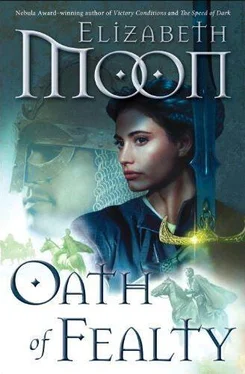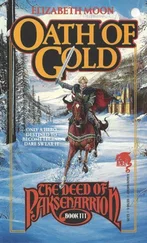“Pedraig wouldn’t,” Dorrin said. “But the man in his body now is not Pedraig. Did any Verrakai sicken and die—or die suddenly, aside from execution—while imprisoned?”
“Three,” Mahieran said. Now he looked worried. “Do you think—”
“I think a Verrakai contrived Pedraig’s illness, and took him over,” Dorrin said. “Perhaps one in prison, perhaps one living concealed in the city, or elsewhere in the palace staff. Though how he could manage that from a distance I do not know. What I do know is that I must go now, immediately, and see this fellow—”
“Now?”
“He will know I have come to the coronation—if it’s not gossip in the stable I’d be amazed—and if it is one I captured and sent here, he knows I have the full magery. He knows I can reveal him. At least the king is safe here, or so I hope—”
Mahieran started. “Gird’s arm! He was about to make his progress—!”
“What?”
“Come,” Mahieran said, and Dorrin followed as he hurried back to the reception. Over his shoulder, Mahieran said, “The new king greets all the palace servants—including in the stables—and then mounts his horse to ride in procession through the city and around the bounds—Midsummer, you know.”
“Take me to Pedraig,” Dorrin said, turning to Marrakai. “Find the king,” she said to Mahieran. “Don’t let him come near his horse.” She was halfway to the palace doors before she realized she had just ordered two senior dukes around as if they were her soldiers. And they had not protested.
Across the wide stone-flagged courtyard, the royal procession was forming: grooms held the horses of those who would ride—Dorrin had declined the honor, having no proper mount for the occasion. The horses were decked out with manes and tails elaborately braided and dressed with flowers and ribbons, bridles and saddles festooned with bells and brightwork. The king’s horse, a Tsaian gray stallion, stood at the head of the line, tossing its head now and then and pawing with one massive hoof. Already some nobles had changed their court shoes for boots and were standing in clumps, chatting as they waited for the king to arrive. From the king’s horse to the gate, a line of grooms held baskets of rose petals, ready to strew them in front of the king as the procession began.
“Pedraig,” Dorrin said to Marrakai. “Is he here?”
“I don’t see—there!” Marrakai nodded at one of the grooms with baskets, a nondescript light-haired man.
As Dorrin’s gaze met that of the man in groom’s livery, she knew at once he was Verrakai … and then, that he was her father. Her father, here ? He smiled, a smile widening into such vicious glee that she felt cold all over, immobilized with horror. Before she could raise a shield of magery, he struck, a bolt of pure enmity and malice aimed not at her but at Marrakai. She parried it, but not fast enough: Marrakai fell as if hit by a stone.
Dorrin stepped over Marrakai’s body, shielding him from further attack, and loosed her own magery, first trying to hold him at bay. But he was stronger than any she had faced before. Again he struck, this time at a horse in the procession, a flick of fire that set its trappings ablaze; it screamed, jerked loose from its handlers and plunged away. The other horses reared, squealing and fighting their grooms; instant turmoil followed, with shod hooves ringing on the stones, shouts of command, screams of fear, the rasp of swords from the sheath.
She glanced around, and a flood of power broke through her shield; she staggered against force that sought to hold her as the king had been held. The sense of weight increased; she felt her knees buckling. With agonizing slowness, she forced her head around to see her father grinning at her, that same feral grin.
You cannot stand against me—daughter . The remembered voice mocked her. No once-born could. Your power came from me; it is part of mine; I am its master .
“Falk’s Oath, you are not,” Dorrin said aloud. Her voice sounded odd, but she was able to force herself upright. “You are evil, your strength comes only from blood magery.” She struggled forward, fighting the pressure of it, drawing her sword, ignoring the plunging horses, the screams and yells. “Falk and the High Lord defend me; they have given me the true magery—”
You sent the mother who bore you to her death; would you kill your own father as well? And you call me evil?
Dorrin ignored that, took step after slow step, as if wading through thick mud. His power pressed on her; she could see no effect of hers on him; he stood there smiling.
Remember those nights in the cell? Remember how you begged for your puny suffering to end? What a coward you were … and are still. Now you are old, barren, weak. An empty husk, useless for anything but torment. I will take your body but keep you as a mind-slave, helpless but aware, and use your power as my own .
Memory flooded her mind: the pain, the smells, the tastes of it. Her father, worse than Carraig … nausea cramped her belly; the vile taste filled her mouth. Unshed tears burned her eyes. Again her knees sagged; her hand’s grip on her sword loosened, and the sword tip fell to the stone, ringing a warning. Her hand clenched tighter. Not again, not again … She tried to say Falk’s name, but her mouth was dry, dry as bone-dust and as bitter. Dry as a cursed well …
A well that now brimmed with clean water. From the depths of despair, from that recent memory, she reached for the source of her own power, the power Falk promised was hers, untainted. Falk’s knight, not her father’s daughter; Falk’s knight, who had freed a woman and her unborn child from a curse that bound them in unending torment, whose tears had renewed the waters.
“Falk,” she managed. At once that sweet, cold water filled her mouth, washing away the taste of evils she had endured, washing away fear and hatred. As she swallowed, the water seemed to renew her whole body; her strength surged back, as water had done in the well. She saw her father’s expression change even as she felt her power mastering him. Could he feel her new determination? Now she held him motionless, and knew he could not flee. Should she bind him for others to capture, or would it be better to kill him herself? She raised her sword, saw his concentration change to fear, and then to glee again … the look she had seen on the child’s face who had been about to force a transfer.
“Falk!” she cried, pleading, and for the first time in her life cast the death spell like a spear, not knowing if it would truly kill.
His face contorted for an instant, and then he fell and lay motionless. Dorrin ran to the fallen body—she felt nothing there—no taint of evil, dire mist as she’d seen after Carraig died, no hint of lingering malice. “I’m sorry,” Dorrin said, to the body that had once been an honest groom’s, as she sheathed her sword. “You were a good man once; you deserved better.”
She looked around—the courtyard was still in chaos. With a touch of magery she calmed the horses, put out the smoldering fire that had started the panic. She hoped no one would notice that part. Duke Marrakai still lay where he had fallen; now his sons crouched beside him, staring at her wide-eyed.
She walked back to them.
“You killed him!” Kirgan Marrakai said, eyes blazing. “You killed them both! He should have known you lied! You’re just like the rest! Traitor!” He drew his dagger and lunged at her. Dorrin barely evaded the thrust, and backed away.
“Kirgan Marrakai—I did not!”
“I saw—he was beside you, he fell, and you tried to make it look like it was that groom. We know him ; we’ve known him for years!”
Читать дальше












